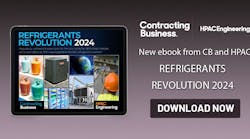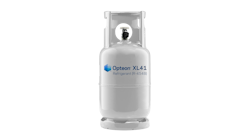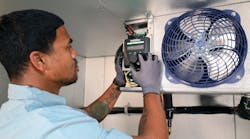There are many ways to expand an HVAC business. For example, plumbing has traditionally been associated with HVAC. Opportunities can also be found in building automation or controls, or electrical service contracting. But, have you considered commercial refrigeration service?
Equipment manufacturers and very large distributors dominate refrigeration equipment installation. Therefore, competing for new installations is probably impossible for the small refrigeration start-up. However, small to mid-size companies are competitive with manufacturers and large distributors in the maintenance/service segment of this business.
Since many large grocery stores and chains have in-house service/maintenance and replacement teams, the most attainable service opportunities can be found in small-box convenience stores, restaurants, specialty stores, refrigerated warehouses, and industrial facilities that use refrigeration.
Know What You Want
When contemplating entering the refrigeration service business, your reasons should be well-defined. Are you “bored,” and looking for something new? If so, you need to be certain that your HVAC manager hasn’t also become bored by HVAC, so that your HVAC business isn’t neglected while you pursue refrigeration business.
Do your existing HVAC customers have refrigeration equipment that you could roll into an HVAC service contract? Do you intend to use refrigeration service work as a hedge against winter downtime?
Whatever your reasons, remember, that the most successful businesses are those that focus on continuous improvement in their strongest areas. They want to become better at what they do best. If you truly don’t have the platform upon which to build a refrigeration business, continue to focus on HVAC only.
Marketing Strategy
Marketing commercial refrigeration is no different than the steps you would take to land an HVAC account. Knock on doors often, and use direct mail, company newsletters, and networking. Ask everyone you meet for his or her refrigeration business. Attend trade shows and restaurant association meetings.
Determine which of your existing HVAC customers have refrigeration equipment service needs. An ideal expansion scenario might be one where you currently have an HVAC service agreement and maintain and service the air-conditioning equipment for a small, multi-location restaurant. These locations might have an ice machine, a sandwich and drink merchandiser, under-counter refrigerator, and a large commercial refrigerator or a walk-in cooler. You must also have a good relationship with this company’s maintenance management staff, and be certain that they’ll trust you enough to allow you to take on their refrigeration equipment.
The main question will be, Do you have the staff, or can you immediately hire the staff capable of servicing and repairing that variety of equipment? Once you win the work, you’d better be ready to fulfill it.
Due to the economy, and an emphasis on service versus first cost for installations, preventive maintenance (PM) is in the forefront of many store and restaurant managers’ minds. Therefore, seek to market refrigeration system preventive maintenance as a specialty. Call on the head of maintenance for your target prospects. You can find out whom that person is by asking store clerks and store managers. Learn the names of your competition, and ask whether or not they’re doing a good job.
In some regions of the U.S., restaurants will bundle kitchen cooking equipment service and maintenance with refrigeration. This isn’t insurmountable. Gas-fired stoves are not totally unrelated to gas fired furnaces, and the rest is plumbing. Make sure you’re aware of the practices in your area and the expertise you’ll need to compete. There are also energy efficiency opportunities in refrigeration. This is one of the last places improvements are made. Finally, you can always carefully consider purchasing an existing, ready-made refrigeration business. However, this involves financial issues that you must evaluate carefully (see sidebar).
Staffing
Your staff of refrigeration experts might be on your payroll right now. Review whether any of your existing employees have experience or training with refrigeration equipment. If you have some, they’re probably among your top air conditioning techs. Again, you mustn’t allow the HVAC service business to suffer should you refocus certain employees on refrigeration. If you think this could happen, hire technicians from outside the company. This, too, brings financial considerations, including medical, insurance, and other benefits.
You may also find you can evaluate and hire in-house technicians from new accounts you happen to obtain.
Training ASAP
Factory training for each piece of equipment must be scheduled. A convenience store chain may have the same brand of ice machine in all of its locations. For example, refrigerators may be a True brand; food merchandisers might be from Structural Concepts, and the walk-in coolers from various off-the-shelf manufacturers. All of this equipment has specific service issues, which your team needs to be prepared to tackle.
Without causing in-house work burnout within the ranks, or neglecting HVAC customers, determine whether your existing HVAC clerical, dispatch, and management staff can be used to manage the logistical and financial portions of your refrigeration business.
Level of Competition
As you make yourself more aware of what you face in terms of competition, it isn’t hard to survey the existing firms in the refrigeration business in your area. Many states require a separate license for refrigeration, which helps you identify them through city records. Make a list of those competitors and learn all you can about them, such as services offered, customers, and number of technicians.
To give you some idea of the ratio, I’m currently marketing to HVAC firms in midsize to small cities, and it appears that one-in-10 air-conditioning firms also provide refrigeration service. In the Dallas region, several firms are strictly commercial refrigeration businesses.
Financial Considerations
Trucks must be purchased, parts placed in inventory, and you have to finance your accounts receivables, through cash or revolving bank credit. As with commercial HVAC, you must pay your labor weekly, and pay for parts monthly, while you wait 60 days or more to be paid by your customer. You must have the cash or revolving bank credit to finance these receivables.
There are also certain liabilities involved in refrigeration that are not found in HVAC. If a freezer fails, you might be responsible for gallons of melted ice cream or other, more expensive food products. You must be protected against liability in all areas related to equipment failure, and, of course, safety.
Real World Scenario
My last refrigeration expansion involved adding one district (about 20 stores) to an HVAC PM agreement. We also became the backup for the other districts in the chain. We did a good job, and in the next two years took over the additional districts, increasing the stores under contract to several hundred locations.
The next year, we expanded to two other cities in the state and doubled the locations under contract. One of the tactics we used to differentiate our service from the competition was to offer full service, and one price for all maintenance and repairs. Of course, as soon as you land that big account you want to add other accounts, so you don’t have all your eggs in one basket.
Michael Glover has 40 years of experience as an HVAC contractor, consultant, and author. His credentials include a Certified Energy Manager designation from the Association of Energy Engineers, and a Leadership in Energy and Environmental Design (LEED) AP certification. He is a past president of the North Texas chapter of ACCA. He can be reached at 903/243 3410.
Business Plan Essentials
Let’s assume you’ve built a nice HVAC service and replacement business and have decided to expand into the refrigeration business. Business 101 tells you that you need a written business plan.
We could write a book on banking, business plans, marketing plans, and budgets but here’s a high-level summary. An expansion in business requires capital. The source of that money can be from your retained earnings, investment from others, or bank loans. The typical plan would be to repay the loans or investment from earnings produced by the new venture or expansion.
Bank loans come in two forms.
- Term loans for trucks are fairly easy to obtain and are secured by the trucks. If you can’t pay the loan from operations, the bank feels fairly secure that it can get its money back with minimal expense by selling the truck.
- A revolving line of credit may be used to fund seasonal requirements for additional cash. You usually have to demonstrate the ability to repay the loan by actually paying it down to zero at least once annually. The bank will want your accounts receivable as the first collateral if you can’t repay the loan. They’ll also want you to pledge all your other assets as a third level of repayment.
Banks don’t “invest” in companies, or take on risk as an investor would do. They’re not viewing your success as a 50-50 proposition.
They want the loan secured on several levels, and able to be easily liquidated. A truck is easy to sell at auction and it’s covered by insurance against other losses. Refrigeration parts are hard to sell at auction and get anything close to the original cost. Regardless of the form of investment, take the time to develop a business plan and a marketing plan.
Include a budget and cash flow forecast. An investor will require it; the bank might want to see the executive summary, and you should require it of yourself if you’re investing your own money. If you can’t make the business work on paper, you don’t have a chance in the real world. If you haven’t prepared a business plan, hire a consultant or get canned software, such as Biz Plan Pro to guide you through the process. The software will ask questions that will require you to dig deeper, so be prepared to spend some time on this and do it right. — MG








